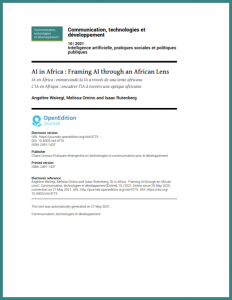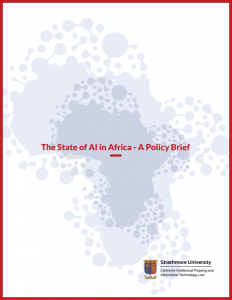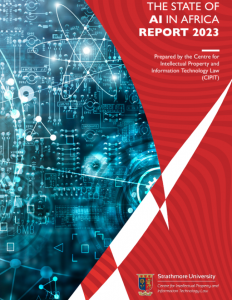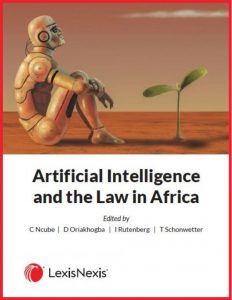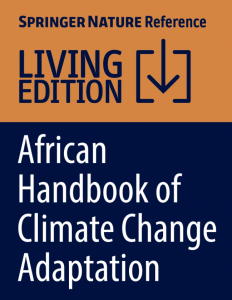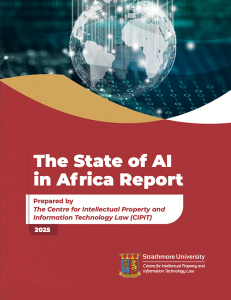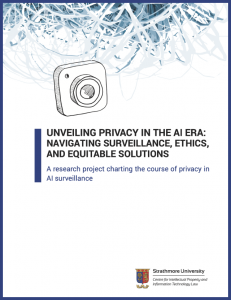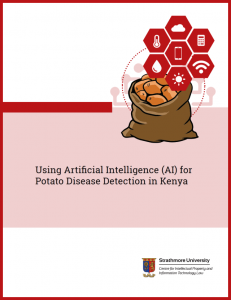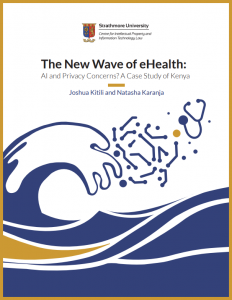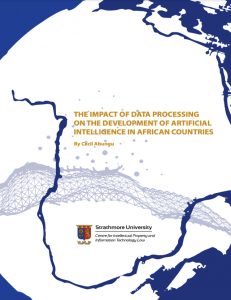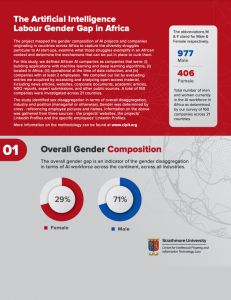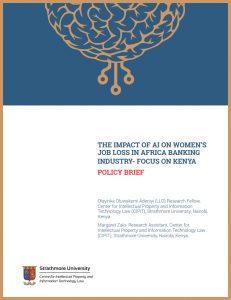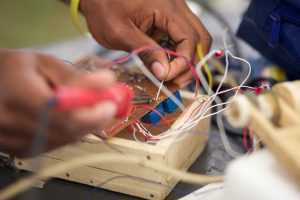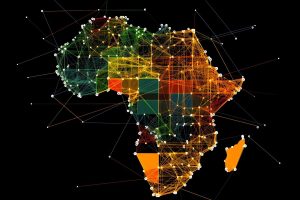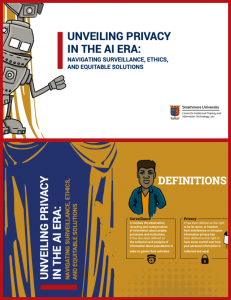Background
Africa continues to express growing interest in the development of an AI ecosystem. This rapidly developing new technology is portrayed to have the potential to solve some of the most pressing challenges in Africa and drive growth and development. Developments in AI have been predominantly driven by private sector technology actors, but growing interest by African governments has seen the start of conversations around “AI strategies” for growth and governance across the continent. It is in line with these thoughts that policy questions around AI arise with prompts to create clear roadmaps to guide the adaptation of AI technology in Africa. Data forms an integral part in the development of AI, the policy implications on the use of data for AI development engender the need to explore law and regulations that govern the use of data by the investors and developers of AI systems. Regionally there are no AI-specific laws or regulations that govern the use of AI, these laws are still in their inception stages. As the continent continues to explore the implications of AI, we endeavor to explore the extent to which data protection laws, regulations, and guidelines are applicable to AI development and to what extent they present safeguards in how AI is developed and used.
A Brief History of AI
Over the years, various scholars have given different definitions of AI, from basic to highly technical and scientific. In 1956, Stanford professor, John McCarthy, a now well renowned Computer Science and Artificial Intelligence innovator, first defined AI to be, the science and engineering of making intelligent machines. It is from this definition that AI was further broadened to refer to, the creation of intelligent hardware or software, able to replicate “human” behaviors such as learning and problem solving or a constellation of technologies that enable machines to act with higher levels of intelligence and emulate human capabilities to sense, comprehend, and act.
The inception of AI dates to the 1950s when researchers in innovation and computer science spent time trying to better understand and improve the ways in which they could actualize the science of making intelligent machines. Machine learning became a popular focus of attempts at improving algorithms to better offer solutions to real-world problems; the success of which prompted AI advocates to make even greater strides in actualizing the use of AI. In the 1970s, however, AI encountered numerous obstacles, particularly where data storage and fast processing were concerned. Computers at the time could not store large amounts of information or process it fast enough. The AI industry entered a period where commercial and scientific activities in AI declined dramatically -the decline triggered by the American government’s decision to pull back on AI research. Consequently, the work on AI stalled, only to be revived in the 1980s by heavy investment by other governments-Japan taking particular interest in realizing the AI dream through the inception of the Fifth Generation Computer System Project (FGCS). Like the rest of the world, Japan was lagging behind the United States in technology, the project was developed with the intention of giving Japan the lead in technological advancements. This quest to realize the AI dream incentivized the funding of expert systems and other AI related endeavors with the goals of revolutionizing computer processing, implementing logic programming, and improving artificial intelligence throughout the 1980s-1990s.
There were significant developments in the use of AI in the 1990s and 2000s. In 1997, great breakthroughs were seen in AI – the world chess champion and grandmaster Gary Kasparov was defeated by IBM’s Deep Blue, a chess playing computer program. Within the same year, a speech recognition software, developed by Dragon Systems, was implemented on Windows. Since then research and development in AI have only grown, characterized by improvements in the performance of AI due to:
- Abundance in computing power – the development and use of state of the art computers that are faster, making it possible to process very large amounts of data sets within short periods of time as needed for training and fast deployment of AI algorithms.
- Rapidly declining storage costs – it is now easier and cheaper to store large amounts of data which is key for successful training and deploying AI algorithms.
- Surge in data availability – in recent years there has been a rapid increase in the availability of datasets which has primarily been propelled by the increase of internet connected devices as well as arise in the use of social media.
- Increase in AI investment – more money and resources are now being invested in AI both from private sectors,
Current AI Status
AI is expected to affect all areas of socio-economic life with AI innovations already in use in various sectors: banking, marketing, entertainment, education, agriculture, and health. Further, governments around the world have begun to see the potential for AI for their economies, societies, and in delivering public services. In 2017, Oxford Insights created a Government Artificial Intelligence Readiness Index to assess how well governments are placed to take advantage of the benefits of automation in their operations. The index covers 194 countries and territories in respect of their preparedness to use AI in the delivery of public services. Regionally, North America ranks as the best performing region with Africa and the Asia Pacific ranking as the worst. The Government Artificial Intelligence Readiness Index of 2019 estimates that AI technologies will add approximately $15 trillion to the global economy by 2030. The index, through its ranking, also presents clear disparities and inequalities in AI readiness between the global governments; showing higher income countries faring better in the ranking than middle or lower income countries.
While AI presents great opportunities for growth and development, it is important to ensure that AI technologies do not widen already existing social and economic inequalities, especially for vulnerable communities and marginalized groups. AI scholars have argued that caution must also be taken in the implementation of AI technologies. Although the standard narrative created surrounds the positive impacts of AI, when consideration is not given to policy implementation and ethical concerns, AI can have drastic negative impacts especially in exacerbating social inequalities, deepening digital divides by introducing new forms of exclusion and AI labour exclusions.
AI in Africa
The AI ecosystem in Africa is rapidly developing. AI has the potential to address some of the most pressing challenges on the continent and further drive growth and development in the core sectors of agriculture, healthcare, public service, and financial services.
Although The Government Artificial Intelligence Readiness Index of 2019 ranks Africa among the worst performing in respect of AI preparedness, the index ranks at least 12 African countries in the top 100. This index presents the regional readiness of African countries to embrace, promote and use AI – clearly ,a lot still needs to be done within the region to ensure the development of a healthy AI ecosystem. Efforts directed towards changes in education systems, through the creation of frameworks that will develop citizens’ skills needed to fully understand and embrace the use of AI, alongside addressing the ethical implications of fair, secure and inclusive use of AI and the re-assessment of laws and legal frameworks to support data driven technologies, innovation and growth, need to be considered.
A big part of building this ecosystem is ensuring that AI is relevant to African culture and context. Data plays a big role in this; ensuring the availability of a broad and accessible pool of data is important in enabling researchers, developers and users to understand, create and drive the use of AI within the different core sectors.
References:
‘Artificial Intelligence for Africa: An Opportunity for Growth, Development, and Democratisation’. https://www.accesspartnership.com/artificial-intelligence-for-africa-an-opportunity-for-growth-development-and-democratisation/#:~:text=The%20rapidly%20developing%20set%20of,efficiently%20and%20effectively%2C%20raising%20yields
Clayton Besaw and John Filitz, ‘Artificial Intelligence in Africa is a Double-edged Sword’. https://ourworld.unu.edu/en/ai-in-africa-is-a-double-edged-sword
Shanhong Liu, ‘Artificial Intelligence (AI) worldwide – Statistics & Facts’, (Statista, 13 March 2020). https://www.statista.com/topics/3104/artificial-intelligence-ai-worldwide
Chris Smith , Brain McGuire , Ting Huang , Gary Yang, ‘History of Artificial Intelligence’, ( University of Washington , 2006). https://courses.cs.washington.edu/courses/csep590/06au/projects/history-ai.pdf
Rockwell Anyoha, ‘The History of Artificial Intelligence’, (Harvard University , Graduate School of Arts and Science, 28 August 2017).
Rockwell Anyoha, ‘The History of Artificial Intelligence’, (Harvard University , Graduate School of Arts and Science, 28 August 2017). http://sitn.hms.harvard.edu/flash/2017/history-artificial-intelligence/?unapproved=247225&moderation-hash=9724821d51b2ba31eddbfde04a03949d#comment-247225
Sanjeev Kapoor, ‘A Look at the Current Status of Artificial Intelligence’. (ITexchange, October 2019), https://www.itexchangeweb.com/blog/a-look-at-the-current-status-of-artificial-intelligence
‘Government Artificial Intelligence Readiness Index 2019’, (Oxford Insights and the International Development Research Centre). https://www.oxfordinsights.com/ai-readiness2019
Alexa Hagerty and Igor Rubinov, ‘Global AI Ethics: A Review of the Social Impacts and
Ethical Implications of Artificial Intelligence’, (Cornell University, 2019). https://arxiv.org/ftp/arxiv/papers/1907/1907.07892.pdf

